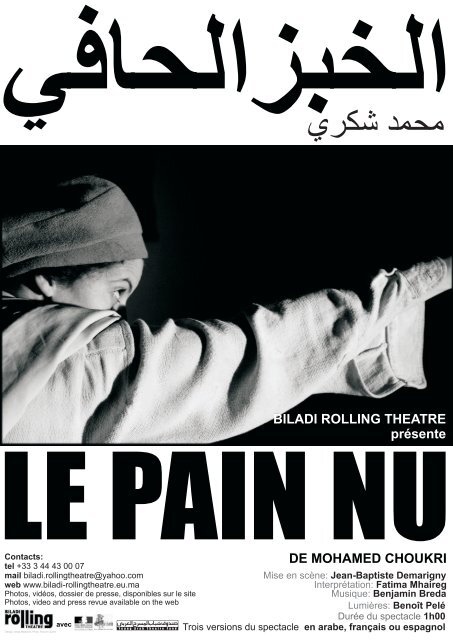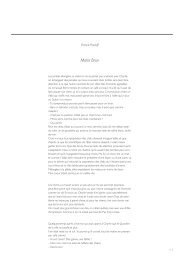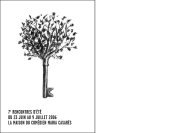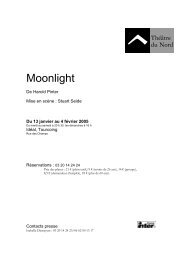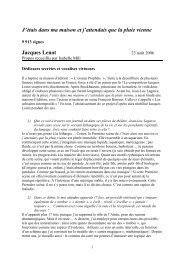E PAIN NU - biladi rolling theatre
E PAIN NU - biladi rolling theatre
E PAIN NU - biladi rolling theatre
- No tags were found...
Create successful ePaper yourself
Turn your PDF publications into a flip-book with our unique Google optimized e-Paper software.
L E <strong>PAIN</strong> <strong>NU</strong>Contacts:tel +33 3 44 43 00 07mail <strong>biladi</strong>.<strong>rolling</strong><strong>theatre</strong>@yahoo.comweb www.<strong>biladi</strong>-<strong>rolling</strong><strong>theatre</strong>.eu.maPhotos, vidéos, dossier de presse, disponibles sur le sitePhotos, video and press revue available on the webDesign: Sanja Maljković, Photo: Rozenn QuéréavecBILADI ROLLING THEATREprésenteDE MOHAMED CHOUKRIMise en scène: Jean-Baptiste DemarignyInterprétation: Fatima MhairegMusique: Benjamin BredaLumières: Benoît PeléDurée du spectacle 1h00Trois versions du spectacle en arabe, français ou espagnol
Mohammed Shukri has learned to write at age 20. He is nevertheless the most important Moroccanwriter of Arabic speaking literature.What he talks about? His life, just as bare as bread is. The portion of life spread over the death of hisyounger brother, killed by his father in a fit of fury, to the day he decided to go to school to learn to readand write. He was 20. And it is an entire country, an entire youth, still current, that appears.Mohammed Choukri wrote as he lived. In a direct and enthusiastic way. Without ruling. In the waypeople live here in Morocco. His legacy, his sources: his people.This nakedness of writing, this sensuality (like Jean Genet whom he was a friend or the Syrian poetMohamed al-Maghut), have banned the book in Morocco until a very recent date.This book is in some ways a modern life-learning novel, fragmented in its shape, as the memoryitself, and in space: the rural exodus Morocco faces since the 30's. The family of the author had toleave his homeland Rif for the city, pushed by the famine. The result: Tangier, Tetouan, Oran ... Theadventures of a young boy who had to feed himself, who discovered humiliation, poverty and sex.The human beings gentleness and crualty. And allowed us to discover it. Once more, without pathos,with a precious innocence.For bread aloneLe pain nuMohamed Choukri a appris à écrire à l'âge de 20 ans. Il est néanmoins l'écrivain majeur de la littératuremarocaine de langue arabe.Ce qu'il raconte ? Sa vie simplement, une vie nue comme le pain. Cette portion de vie qui va de la mort de sonjeune frère, tué par son père dans un accès de fureur, au jour où il se décida à aller à l'école pour apprendre àlire et écrire. Il avait vingt ans. Et c'est tout un pays, toute une jeunesse, encore actuelle, qui apparaît.Mohamed Choukri écrit comme il vit. D'une façon directe et enthousiaste. Sans jugement. A la manière dontles gens vivent, ici, au Maroc. Son héritage, ses sources : son peuple. C'est cette nudité de l'écriture, cettesensualité (à la façon de Genet, dont il fut l'ami, ou du poète syrien Mohamed al-Maghout) qui ont valu au livred'être interdit au Maroc jusqu'à une date très récente.Ce livre est d'une certaine façon un roman d'apprentissage moderne ; fragmenté dans sa forme, comme lesouvenir lui-même, et dans l'espace : l'exode rural que connaît le Maroc depuis les années 30. La famille del'auteur est contrainte de quitter son Rif natal pour la ville, poussée par la famine. La suite : Tanger, Tétouan,Oran... les péripéties d'un jeune garçon dans la nécessité de subvenir seul à ses besoins, qui découvrel'humiliation, la misère et le sexe. Le monde doux et cruel des hommes. Et nous le fait découvrir. Encore unefois, sans aucun pathos, avec une précieuse naïveté.
''Born on a cracked, dry and desolate land,Mohamed Shukri soon has experienced theviolence of need, the demand of hate and thedeath face . Very soon, Mohamed discovered alsosexuality. A fear haunted him, not to be raped. Forthat he preferred to sleep in graveyards, where theliving are afraid of the dead and the dead do notrise to threaten "the beautiful kid with pretty littleass". Mohamed Choukri spoke with simplicity ofhis first sexual experiences, his discovery of thewomen’s sex. (...) He will learn a lot of things in theworld of whores, in brothels, bars, alleys, withthieves, pimps, smugglers, and so on. Such is thebreadless life, without tenderness. A text naked. Intruth, lived in the simplicity of the first emotions. It isnot a coincidence that the manuscript of this storyhas been denied by publishers in the arabic world.What Chukri tells is part of this sort of things thatshouldn't be told, or at least that shouldn't bewrotten in the books. Prostitution exists. Everyonerecognizes that. But talking about it, remainsintolerable. It is worse to write about the misery thatto live it! ''Tahar Ben Jelloun, preface to the French editionof Pain Nu, Paris 1979.Mohamed Shukri was born in 1935 in Beni Shiker,a small village in the Berber Rif near Nador inMorocco.Raised in a poor family, he fled at the age of 11 andbecame a street child from Tangier, where he livesin the slums of the city. At the age of 20, he decidedto learn to read and write and to become a teacher.In the 60’s, in the cosmopolitan Tangiers, he willmeet Paul Bowles, Jean Genet and TennesseeWilliams. He began to be published in 1966 (in Aladab,monthly Beirut). His international successcomes with the English translation, by PaulBowles, Al-khoubz Al-Hafi (Le Pain nu, For Breadalone, Peter Owen editions) in 1973.The book will be translated into french by TaharBen Jelloun in 1980, published in Arabic in 1982and banned in Morocco from 1983 to 2000.He died in 2003 at the military hospital in Rabat.« Né sur une terre fêlée, sèche et désolée, MohamedChoukri a tôt connu la violence du besoin, l'exigencede la haine et le visage de la mort.Très tôt aussi, Mohamed découvrit la sexualité. Unepeur le hantait, celle d'être violé. Pour cela il préféraitdormir dans les cimetières, là où les vivants ont peurdes morts et où les morts ne se lèveront pas pourmenacer « le beau gosse au joli petit cul ». MohamedChoukri parle avec simplicité de ses premièresexpériences sexuelles, de sa découverte du sexe dela femme. (...) Il apprendra beaucoup de choses,dans l'univers des putains, dans les bordels, lescafés, les ruelles, avec des voleurs, des proxénètes,des contrebandiers, etc.Telle est cette vie sans pain, sans tendresse. Un textenu. Dans la vérité du vécu, dans la simplicité despremières émotions. Ce n'est pas un hasard si lemanuscrit de ce récit a été refusé par les maisonsd'édition dans le monde arabe (écrit au début desannées 70, il ne sera publié en arabe qu'en 1982 etne sera autorisé au Maroc qu'en 2000). Il faut direque ce que raconte Choukri fait partie de ce genre dechoses qui ne se disent pas, qu'on tait, ou du moins,qui ne s'écrivent pas dans les livres. La prostitutionexiste. Tout le monde le reconnaît. Mais en parler, ladire, reste intolérable. Il est donc plus grave d'écriresur la misère que de la vivre! »Tahar Ben Jelloun, préface à l'édition française duPain Nu, Paris 1979.Mohamed Choukri est né en 1935 à Beni Chiker, unpetit village berbère du Rif près de Nador au Maroc.Élevé dans une famille pauvre, il s'enfuit à l'âge de 11ans et devient enfant des rues de Tanger, où il vitdans les bas-fonds de la ville. À l'âge de 20 ans, ildécide d'apprendre à lire et à écrire et deviendrainstituteur.Dans les années 60, dans le Tanger cosmopolite, ilfera la rencontre de Paul Bowles, Jean Genet etTennessee Williams. Il commence à être publié dès1966 (dans Al-adab, mensuel de Beirut). Son succèsinternational viendra avec la traduction en anglais,par Paul Bowles, de Al-khoubz Al-Hafi (Le Pain nu,For Bread alone, Peter Owen editions) en 1973. Lelivre sera traduit en français par Tahar Ben Jelloun en1980 (éditions Maspéro), publié en arabe en 1982 etinterdit au Maroc de 1983 à 2000.MohamedChoukri
The showA novelFor Bread alone is a short novel, not a play. Writtenin a simple and concrete language, it gives theimpression of dealing with the matter itself. That isthe challenge that we wanted to face: to give to theaudience a feeling similar to the one we had asreaders.To this goal we have sought to shrinking the text onstage. Instead of it, wherever it seemed possible,we preferred the weight of action or suggestiveimages.Le spectacleUn romanLe Pain nu est un court roman, non pas une pièce dethéâtre. Écrit dans une langue simple, concrète, ildonne l'impression d'avoir affaire à la matière ellemême.C'est le défi que nous avons voulu relever :donner aux spectateurs une impression similaire àcelle que nous avions eu comme lecteurs. Pourcela, nous avons cherché à raréfier le texte surscène. Partout où cela nous a semblé possible,nous lui avons préféré le poids de l'action ou celuid'images suggestives.
The scene, place of perpetual metaphors.We worked on the emptyness of stage, whichgives to the only actor’s performance, all theincarnations and meanings.So the actor's body became the matter of thewhole performance.Because this is what the text deals with: life,conceived as a story of the body needs. From abody caught in the network of social determinismthat are poverty, morality, sexuality in theProtectorate of Morocco.Therefore, the actress, alone on the stage,interprets in turn not only all the characters, butalso where the text requires, a tree, a flock, thefamine.So goes it also with the rare objects, metaphorisedby the use to which they are put. From a floorcloth,we made a chicken, then Mohamed Shukri's littlesister , and then again a floorcloth and a honey pie.A moroccan showLooking increasingly for a proper theatricallanguage, we have gone to the roots of traditionalspectacular forms of Morocco. Therefore, theshow will sometimes turns into the way of theMoroccan popular <strong>theatre</strong> itself: Halqa, wherecrowd forms a circle around the actor, as we stillfind some on the the Jamâa - Fna place inMarrakech.And last but not least, we picked up, in theMoroccan society, a further understanding of thedescribed situations. To serve us as a matter ofgestures and characters that the actress, whogrew up in this country, carries with her.La scène, le lieu de métaphores perpétuelleComme s'il s'agissait du pain lui-même, nous avonstravaillé sur la nudité de l'espace scénique quidélègue au seul jeu du comédien l'ensemble desincarnations et des significations. Alors le corps del'acteur est devenu la matière même du spectacle.Parce que c'est de cela dont traite le texte : la vie,conçue comme une histoire des besoins du corps.D'un corps pris dans le réseau des déterminismessociaux que sont la misère, la morale, la sexualité,dans le Maroc du Protectorat. Dès lors, l'actrice,seule sur scène, interprète tour à tour, nonseulement l'ensemble des personnages, maisaussi, là où le texte l'exige, un arbre, un troupeau, lafamine. Ainsi en va-t-il également des rares objets,que l'usage qui en est fait, métamorphose. D'uneserpillière, nous avons fait une poule, puis la petitesoeur de Mohamed Choukri, puis à nouveau uneserpillière, puis une galette de miel.Un spectacle marocainEn quête d'un langage toujours plus proprementthéâtral, nous avons puisé dans les formesspectaculaires traditionnelles du Maroc. Aussi, lespectacle ne va-t-il pas, parfois, sans rappeler lafaçon du théâtre populaire marocain: le Halqa, où lafoule forme un cercle autour des acteurs, tel qu'onen trouve encore certains avatars sur la placeJamâa le-Fna de Marrakech. Enfin, un des axes dutravail a été d'aller chercher dans la réalité de lasociété marocaine une compréhension plus ampledes situations évoquées. De nous servir de lamatière gestuelle et des personnages que l'actrice,ayant grandit dans ce pays, porte en elle.
The show is part of the Theater around the Mediterranean Project leaded by the Biladi RollingTheater.Planed over a long period, the Project consists in settling each time for two years, in a differentcountry (or area) around the Mediterranean, to creating a show, with young local artists, that dealswith fundamental issues of their society.The show is then performed in front a mostly popular audience. Thus, For Bread alone, wasperformed in 2008 in the remote towns of the Moroccan territory.Theater around the MediterraneanThéâtre en MéditerranéeLe spectacle s'inscrit dans le cadre du projet Théâtre en Méditerranée mené par la compagnie Biladi RollingTheatre.Envisagé pour une période de plus d'une dizaine d'années, le projet Théâtre en Méditerranée consiste às'établir, pour deux ans à chaque fois, dans un pays (ou zone) du pourtour méditerranéen, et à y créer, avec dejeunes artistes locaux, un spectacle qui traite des questions fondamentales qui travaillent leur société.Le spectacle est ensuite présenté, et c'est le second axe du projet, à un public principalement populaire, peucoutumier des salles de spectacle. Ainsi, le Pain nu a tourné en 2008, dans les villes reculées du territoiremarocain.
The show in MoroccoThe original text was first known in Moroccothanks to its translations, because of its fortyyears prohibition. So that, when, at thebeginning of the XXI th century, it was finallyauthorized, all those likely to read it, namelythe national intelligentsia, already knew it. Forthe others, the common people, suchpermission made no difference, because oflack of access to culture, and particularly tobooks.By choosing to perform For Bread alone inMorocco, our ambition was to restore hisauthor to the people, and thereby a part of hishistory.With the support of the French Embassy, wereached smaller cities of Morocco (Temara,Khemisset, Tifelt, Oued Zem Beni Mellal,Youssoufia, El Kalâa of Sraghna Ben Guerir,Zagora, Erfoud, Errachidia, Figuig ...), playingwherever we could.The audience, mostly composed of youngmen and young women, gave a very warmwelcome to the show, thanking us after eachperformance through the same words: “This isour life, that you performed“.Le spectacle au MarocParce qu'interdit au Maroc pendant une quarantained'années, le texte original a d'abord été connu parses traductions, rentrées en contrebande. Si bienque, lorsqu'il fut finalement autorisé, au début duXXI eme siècle, tous ceux susceptibles de le lire, àsavoir l'intelligentsia nationale, en avaient déjà euconnaissance par ce biais-là. Pour les autres, lepeuple, cette autorisation ne fit aucune différence,en raison du manque d'accès à la culture, a fortiorilivresque.En choisissant de créer le Pain nu au Maroc, notreambition était donc de restituer au peuple sonauteur, et par là même, une partie de son histoire.Grâce au soutient de l'Ambassade de France, nousavons sillonné, avec le spectacle, les petites villesdu Maroc, pour la plupart géographiquement, sinonéconomiquement et culturellement sinistrées(Témara, Khémisset, Tifelt, Oued Zem, Béni Mellal,Youssoufia, El Kalâa des Sraghna, Ben Guerir,Zagora, Erfoud, Errachidia, Figuig...), jouant àchaque fois là où nous le pouvions.Ce public, non averti, majoritairement composé dejeunes gens et de jeunes femmes, a rendu unaccueil extrêmement chaleureux au spectacle,nous remerciant après chaque représentation, desmêmes mots: « C'est notre vie, que vous avezreprésentée ».Le spectacle en FranceUne version française du spectacle a par la suite vuele jour pour être jouée en France.C'est que le Maroc, toujours bien actuel, queprésente Mohamed Choukri est loin des images quenous en avons ici, aussi différentes soient-elles l'unede l'autre. La première, folklorique, entretenue parles tour operators, et l'autre, pure et traditionaliste,fantasmée par les secondes et troisièmesgénérations d'immigrés.C'est en pensant à eux, à ces jeunes genssemblables et pourtant si différents de ceux que nousavons rencontrés au Maroc, que nous avons crééune version plus légère du spectacle, destinée à êtrejouée dans les collèges et lycées. Parce que, poureux aussi, d'une certaine façon, se pose la questionde l'accès à la culture: d'une culture qu'ils sentent lesconcerner.
jean-baptiste demarignybaptistakis@yahoo.frles rustres, 26170 PLAISIANSnationalité françaisâge 32 anslangues parlées anglais allemand grec moderneJean-Baptiste Demarigny, metteur en scène français, est né en 1977.Après des études de philosophie à la Sorbonne, il rejoint en 2002 le Conservatoire National deMontpellier, dirigé par Ariel Garçia-Valdès, où il sera profondément marqué par l'enseignementde Christophe Rauck et Bruce Myers. Il y fonde alors la compagnie Biladi Rolling Theatre aveclaquelle il crée ses premiers spectacles.En 2006, il part vivre au Maroc, pour la première édition du projet de théâtre itinérant : Théâtre enMéditerranéeIll y écrit et met en scène ''En attendant que la Neige tombe'' avec de jeunes comédiensmarocains. Ils partiront à la conquête de nouveaux publics et tourneront le spectacle dans denombreuses villes du territoire marocain jusqu'en juin 2007.Il est invité, en 2008, en résidence de création par la compagnie espagnole Karlik Danza Teatro.Il y met en scène "le Pain nu" de Mohamed Choukri.En 2009, il part vivre à Belgrade pour la seconde édition du projet Théâtre en Méditerranée. Il yécrit et met en scène "Jedan zarez Nešto" ("Un Virgule Quelque Chose") d'après les textes dePredrag Matvejevic.En 2010, il s'installe en Bosnie pour la création de "Napred-Nazad" ("Allers-retours") d'après Horvath, et la préparation d'uneécole éphémère de théâtre dans les Territoires occupés.Il a par ailleurs été invité à plusieurs conférences sur ledialogue entre les cultures.Jean-Baptiste Demarigny, French director, was born in 1977.After philosophy studies at the Sorbonne, he joined in 2002 the Conservatoire National de Montpellier, headed by ArielGarcia-Valdez, where he will be profoundly influenced by his professors Christopher Rauck (Théâtre du Soleil / ArianeMnouchkine) and Bruce Myers (Peter Brook). He then founded the Biladi Rolling Theater with which he created his firstshows.In 2006 he went to live in Morocco for the first edition of the itinerant theater project: Theater around the MediterraneanIll be written and direct ''Pending the snow falls'' with young Moroccan actors. They will go to conquer new audiences andturn the show in many cities of Moroccan territory until June 2007.He was invited in 2008 in residence by the Spanish Karlik Danza Teatro. He directed there "For Bread Alone" by MohamedChoukri.In 2009, he moved to Belgrade for the second edition of the Theater around the Mediterranean project. He wrote andstaged "Jedan Zarez Nešto" ( "One point something") based on Predrag Matvejevic's texts.In 2010 he settled in Bosnia-Herzegovina for the production of "Napred Nazad" ( "Back & Forth") by Horvath, andpreparation of an ephemeral theater school in the Occupied Territories.He has also been invited to several conferences on dialogue between civilisations and cultures.Fatima MhairegBoulevard Moulay Abdellah, Marrakech Marocfatimatoun1@gmail.comnationalité marocaineâge 30 anslangues parlées arabe, français,anglais, espagnolCrédit photos: Rozenn QuéréConception graphique: Sanja MaljkovicFatima Mhaireg is a Moroccan actress born in 1980 in Marrakech.She studied economy befor she joined the Dramatic Art Institut (I.S.A.D.A.C.) inRabat in 2002. She was tought by Moroccan and foreigner artists (Smail Smouni,Cristina Silveira, Vladimir Granov, Bruce Myers, Yoshi Oida...) and performed innumerous shows (Taxi by Générik Vapeur, Titeless by Lorca, dir. Roberto Cerda...)that leaded her abroad.She will be award in 2006 for her part in Goodnight Mother by M. Norman. In 2006she also meets Jean-Baptiste Demarigny and stars in the show ''Pending thesnow falls''. She becomes associated artist of the Biladi Rolling Theatre. She will beinvited by Jose Monleon to participate to several conferences. She writes for theSpanish <strong>theatre</strong> revue Primer Acto.Fatima Mhaireg, actrice marocaine, est née en 1980 à Marrakech.Elle étudie à l'Institut d'Art Dramatique (I.S.A.D.A.C.) de rabat auprès d'artistesmarocains et étrangers (Smail Smouni, Cristina Silveira, Vladimir Granov, BruceMyers, Yoshi Oida...) et joue dans de nombreux spectacles (Taxi de GénérikVapeur, Sans Titre de Lorca, m.e.s. Roberto Cerda...) qui la conduiront parfoishors du Maroc.Elle sera récompensée en 2006 pour son interprétation de la mère dans la pièceBonsoir Maman de M. Norman. En 2006, elle rencontre Jean-Baptiste Demarignyet participe au spectacle ''En attendant que la Neige tombe''. Elle devient artisteassociée de la compagnie Biladi Rolling Theatre. Elle sera invitée par JoseMonleon (fondateur de l'Institut International du Théâtre Méditerranéen) àparticiper à plusieurs conférences. Elle écrit pour la revue espagnole Primer Acto.


